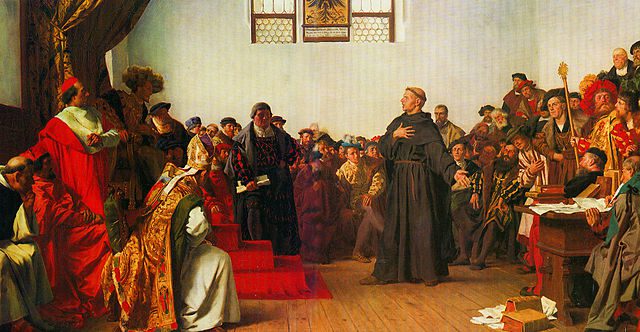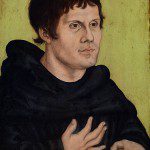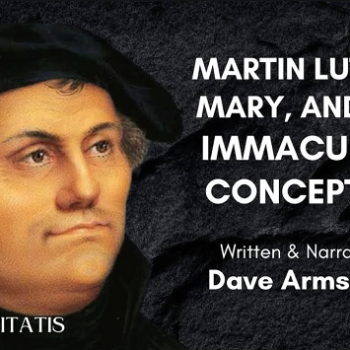Luther at the Diet of Worms (1877), by Anton von Werner (1843-1915) [public domain / Wikimedia Commons]
***
[6-2-03; slightly revised on 12-8-11]
***
The so-called Protestant “Reformation” had to do with the abolition of five of seven sacraments, the move to sola Scriptura as the rule of faith over against an authoritative Church and councils and apostolic succession and episcopacy (and including a papacy as well), the ending of the Sacrifice of the Mass, the move away from transubstantiation, the ditching of purgatory, the end of baptismal regeneration among many Protestants, and even infant baptism in some camps.
*
It had to do with the cessation of the notion of the communion of saints and intercession of saints, and much of Mariology, and forensic, imputed justification vs. infused; the removal of seven previously accepted books from the Bible.
*
What does the corruption of the medieval papacy have to do with Luther’s adoption of double predestination and utter rejection of free will, or Calvinist iconoclasm or the suggestion from the highest Protestant quarters to Philip of Hesse that he lie about his bigamy; or the widespread early Protestant antipathy to philosophy and science and art? Etc., etc., etc.
*
To act as if the Protestant Revolt would not have happened but for medieval problems of schism and papal power is to ignore a host of other factors, as if they were non-contributors. It’s historically ludicrous. No Catholic who knows history at all will deny that that Catholic corruption was a major factor, but to claim that some reforms of the papacy would have prevented the so-called “Reformation” is a position which is well-nigh unprovable, given all that occurred during that turbulent time, and how many traditional Christian doctrines were ditched by the Protestants. There was far more going on here than merely the usual intrigues of church politics and power plays.
*
Some claim that there may not have been a “Reformation” if only the papacy had been reformed in the earlier Middle Ages. But what does getting rid of the papacy and episcopacy and apostolic succession have to do with a corrupt papacy? In other words, how does corruption lead to a conclusion of utter worthlessness, such that something can be discarded? Something is either intrinsically bad and evil or unbiblical or it is not.
*
If it were intrinsically a bad thing, then it wouldn’t take corruption to want to get rid of it (as an evil thing is already “corrupt” anyway). If it is not intrinsically bad, then the proper response is to reform it and get it back to where it should be, not banish and abolish it. Either way, it makes no sense. If the Papacy “per se” wasn’t the problem, why, then, was the papacy abolished in Protestantism? This is nonsensical, incoherent reasoning.
*
The “Reformation” was not that (it is a misnomer), but rather, a Revolution insofar as it departed from passed-down Christian Tradition, as I am demonstrating in a roundabout way. It was a Christian movement, but not a “reformation” of some so-called pure early church, because such an animal never existed (i.e., the early church did not remotely resemble any brand of Protestantism, which claimed to merely be restoring it — the literal meaning of “Reformation”). One can’t re-form something that never existed in any form.
*
The Catholic has as much right to call what happened a Revolt as the Protestant has to call it aReformation. I don’t choose terms of historical epochs based on partisan concerns. I would argue that “Revolt” is much more neutral, whereas “Reformation” presupposes in its very use and literal meaning a Protestant outlook. We deny that what Protestantism brought the world was a return to the early Church, so how can we use the term?
*
It has become a standard term just as Enlightenment has, but note how the latter is also thoroughly biased. All Christians can agree, however, that what happened in the 18th century was no “enlightenment” — a big light that went on in culture because Christian tenets were being rejected and the goddess of “reason” put in their place.
*
Dogmas and corruptions in practice are two different things. If indeed the papacy can be defended from the Bible alone, what effect does corruption fourteen centuries later have to do with that case? Even during the life of St. Paul, he was railing against the corrupt churches, yet still calling them (most interestingly) “churches.” Jesus did the same at the beginning of the book of Revelation. Thus, such a thing as a papacy can exist and be defended from Scripture and theological reasoning, whether it is corrupt or not. Corruption does not render something non-existent.
*
St. Catherine of Siena railed against corrupt popes every bit as much as Luther did. But she did it with intelligence, sanctity, and lack of foul-mouthed vulgarities and widely distributed woodcuts showing, e.g., the pope being expelled from the anus of a goat, etc. St. Catherine, after all, still believed in the papacy, whereas Luther had abandoned it because the Church was so brash and “closed-minded” as to refuse to adopt his heresies.
*
Let’s try an analogy to bring the point home. How about if I rush up to a Calvinist school (or Westminster Seminary or some place like that) and demand that they deny TULIP and if not, to show me from “Scripture and plain reason” how they can possibly defend their “clearly false” beliefs?
*
Failing that, I will stomp my foot, cry “here I stand” and be carried out by the staunch defenders of Established Orthodoxy, perhaps fleeing to a present-day Wartburg Castle in the backwoods of Maine, where I can come up with ideas for vulgar woodcuts of Calvin or R. C. Sproul being eliminated from the rear end of a grizzly bear. I’m sure I would be wildly popular in Calvinist circles, wouldn’t I?
***
Meta Description: Explanation of the basic Catholic outlook concerning what happened when Protestantism arose in the 16th century.
*
Meta Keywords: Luther, Martin Luther, founder of Protestantism, origin of Protestantism, Protestant Reformation, Reformation, Protestant reformers, Reformers, Lutheranism, religious wars, 16th century Germany, Protestant revolt, Protestant Revolution, 95 Theses, Here I stand, Diet of Worms, Philip Melanchthon, Counter-Reformation, Catholic Reformation, Bondage of the Will, Peasants’ Revolt














